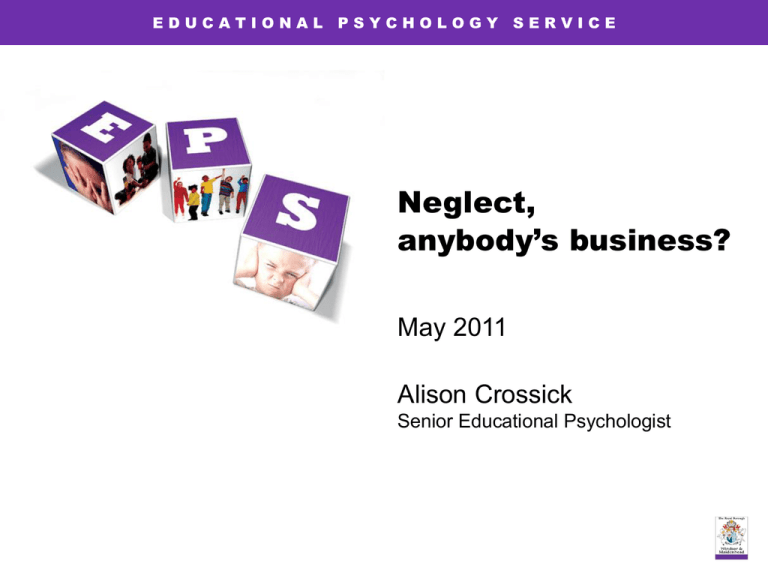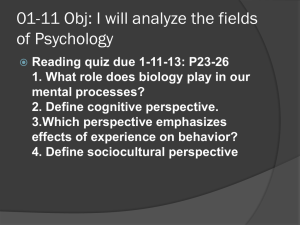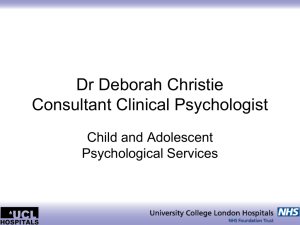Neglect - anybodys business
advertisement

EDUCATIONAL PSYCHOLOGY SERVICE Neglect, anybody’s business? May 2011 Alison Crossick Senior Educational Psychologist EDUCATIONAL PSYCHOLOGY SERVICE Presentation overview • • • • • • Neglect – what do we mean? Building attachment Self-regulation The impact of parenting Intervention/therapy: what, when & why What can we do? EDUCATIONAL PSYCHOLOGY SERVICE Category of Need 2010 64,400 children 2% 8% 12% 9% 4%3% Abuse or neglect 62% EDUCATIONAL PSYCHOLOGY SERVICE Impact of neglect on the developing brain of a 3 yr old The CT scan on the left shows an average developing brain. The scan on the right is from a 3 year old suffering extreme global neglect. From: Child Welfare Information Gateway EDUCATIONAL PSYCHOLOGY SERVICE The story of the 3 mice • First mouse – Each time he pressed the button a tasty morsel of food was delivered. • Second mouse – Faulty button delivered food inconsistently. • Third mouse – Button didn’t work at all. From:Pearce (2009) EDUCATIONAL PSYCHOLOGY SERVICE Maslow’s hierarchy 5 fulfilment needs 4 esteem needs 3 social needs 2 safety needs 1 physiological needs Higher level needs Basic needs EDUCATIONAL PSYCHOLOGY SERVICE The continuing story… • First mouse – Each time he needed comforting his parent or surrogate mouse parent was there for him. • Second mouse – Sometimes his parent or surrogate mouse responded with love and was empathic to his needs, but it varied from day to day. • Third mouse – No-one was emotionally available to him. EDUCATIONAL PSYCHOLOGY SERVICE Sometimes looking sad is met with friendly concern, and sometimes you are berated and punished. But you just never know….. (Cameron child, Jessica, 1978) EDUCATIONAL PSYCHOLOGY SERVICE What is attachment? It is described as the dependency relationship a child develops towards his or her primary caregiver. A deep, loving human relationship in early life is at the very core of self-esteem. EDUCATIONAL PSYCHOLOGY SERVICE Why is it important? • It is thought that the success or failure of early attachments affect young children’s beliefs & expectations about relationships. • This representation of relationships influences the way children interact with others & evaluate themselves. EDUCATIONAL PSYCHOLOGY SERVICE Secure & insecure attachments Securely attached children Insecurely attached children • Generally view the world as a safe place • View other people as a source of nurture & support • View themselves as worthy of attention • When they encounter difficulties, more likely to seek help • Often view the world as unpredictable and threatening • View other people as harsh, unavailable or insensitive • View themselves as unworthy of being nurtured • When they encounter difficulties more likely to become frustrated, angry & give up EDUCATIONAL PSYCHOLOGY SERVICE Disorganised attachment When a young child feels: – physically or psychologically unsafe – abandoned – vulnerable EDUCATIONAL PSYCHOLOGY SERVICE Attachment as a Regulatory system Emotion Reflection Regulation Behaviour Cognition EDUCATIONAL PSYCHOLOGY SERVICE Over arousal in attachmentdisordered children EDUCATIONAL PSYCHOLOGY SERVICE Anxiety/Over arousal Fight Anxiety/over arousal Flight Freeze Aggression Hyperactivity Disassociation Arousal reduction EDUCATIONAL PSYCHOLOGY SERVICE What is a ‘good’ parent? Over 75,000 different parenting books (Barna 2007) •Importance of promoting a pro-active rather than a reactive role. •Providing a positive rather than a problem-focused approach. •Understanding parent/carers own background. Question to parents/carers: What were your hopes & dreams? EDUCATIONAL PSYCHOLOGY SERVICE Pillars of Parenting S. Cameron & C. Maginn 3 Categories: • Developing a sense of well-being. • Managing life events • Acquiring social competence. EDUCATIONAL PSYCHOLOGY SERVICE Developing a sense of well-being by • providing quality care& protection • building warm relationships • promoting an appropriate level of selfperception/self-worth • ensuring a sense of belonging. EDUCATIONAL PSYCHOLOGY SERVICE Managing life events by • enhancing resilience • teaching self-management skills. EDUCATIONAL PSYCHOLOGY SERVICE Acquiring social competence by • improving emotional competence • developing personal and social responsibility. EDUCATIONAL PSYCHOLOGY SERVICE What can we do? Playfulness – A lighthearted relaxed & playful attitude to help the child experience fun & love. Acceptance – Accepting the child’s behavioural choices and his/her feelings. Show your understanding and help the child with the consequences of these choices. Curiosity – Wonder together with the child the meaning behind their behaviour. This can mean making a ‘best guess’. Empathy – Convey acceptance of the inner child. Dan Hughes EDUCATIONAL PSYCHOLOGY SERVICE Attunement • Coach parents/carers to recognise when a child is actually hearing ‘Jaws’ rather than soothing classical music. • Learn the cues when a child is afraid, rather than ‘naughty’ or ‘bad’. • Match affect – rhythm & intensity of emotion. • If there is a difference between verbal & nonverbal, always go with the non-verbal. • Always repair. EDUCATIONAL PSYCHOLOGY SERVICE Therapy Why When What EDUCATIONAL PSYCHOLOGY SERVICE So, when is an intervention/therapy appropriate? Consultation: Behaviour Support Tel: 01628 685662 Healthy Minds Tel: 01628 683762 CAMHS Tel: 01628 640300 Why a particular therapy? Why will therapy not always work? When it works, what does it look like? Therapy is not (and cannot be) an exact science EDUCATIONAL PSYCHOLOGY SERVICE Making the connections… “Children need to know they’ve got support otherwise how are they going to be brave enough to say anything?” Bella, 22, research participant. Child Cruelty in the UK 2011 • Education programmes designed to meet the child’s development age. • Denial is linked to shame. Once you take the shame away, you can change the habit (e.g. lying & stealing). •Match the child’s emotions in a safe way. •Always give a 2-sentence rationale for your request or behaviour. •The ‘love’ step. •Give suggestions as to how the child may be feeling. •Show authentic warmth. •The best predictor to decrease anger is to show comfort and support. •Play & have fun……. EDUCATIONAL PSYCHOLOGY SERVICE References Barna,G. (2007) Revolutionary Parenting: What Research Shows Really Works. Ventura, C.A:Barna Group Cameron,R.J & Maginn,C (2009) Achieving Positive Outcomes for Children in Care. Sage Publications Child Cruelty in the UK 2011. www. nspcc.org.uk Child Welfare Information Gateway DCSF: Children Looked After in England Geddes, H. (2006) Attachment in the Classroom. Worth Publishing Golding,K et al (2008) Thinking Psychologically About Children who are Looked After and Adopted. Wiley Hughes,D. (2006) Building the Bonds of Attachment. Jason Aronson Pearce, C. (2009) Attachment & Attachment Disorder. Jessica Kingsley Publishers Perry, A. (2009) Teenagers and Attachment. Worth Publishing EDUCATIONAL PSYCHOLOGY SERVICE Thank you Please do not use or copy any slides without prior permission from RBWM EPS








